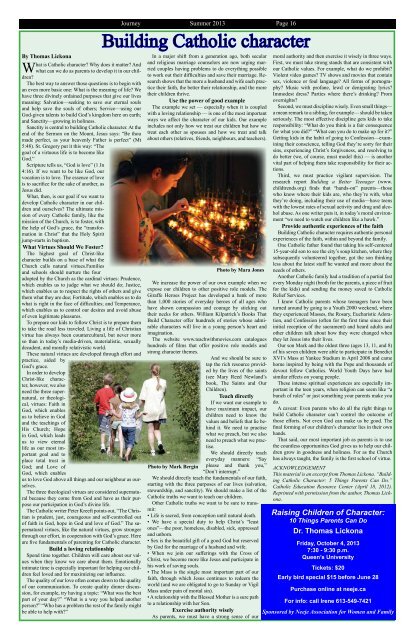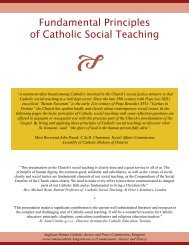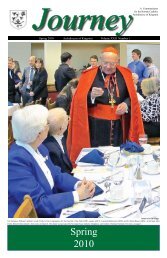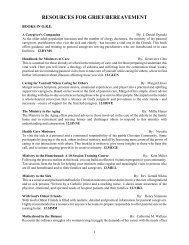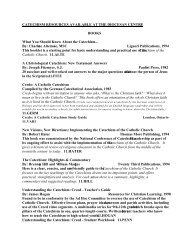Summer 2013 - Archdiocese of Kingston
Summer 2013 - Archdiocese of Kingston
Summer 2013 - Archdiocese of Kingston
- No tags were found...
Create successful ePaper yourself
Turn your PDF publications into a flip-book with our unique Google optimized e-Paper software.
By Thomas LickonaWhat is Catholic character? Why does it matter? Andwhat can we do as parents to develop it in our children?The best way to answer those questions is to begin withan even more basic one: What is the meaning <strong>of</strong> life? Wehave three divinely ordained purposes that give our livesmeaning: Salvation—seeking to save our eternal soulsand help save the souls <strong>of</strong> others; Service—using ourGod-given talents to build God’s kingdom here on earth;and Sanctity—growing in holiness.Sanctity is central to building Catholic character. At theend <strong>of</strong> the Sermon on the Mount, Jesus says: “Be thoumade perfect, as your heavenly Father is perfect” (Mt5:48). St. Gregory put it this way: “Thegoal <strong>of</strong> a virtuous life is to become likeGod.”Scripture tells us, “God is love” (1 Jn4:16). If we want to be like God, ourvocation is to love. The essence <strong>of</strong> loveis to sacrifice for the sake <strong>of</strong> another, asJesus did.What, then, is our goal if we want todevelop Catholic character in our childrenand ourselves? The ultimate mission<strong>of</strong> every Catholic family, like themission <strong>of</strong> the Church, is to foster, withthe help <strong>of</strong> God’s grace, the “transformationin Christ” that the Holy Spiritjump-starts in baptism.What Virtues Should We Foster?The highest goal <strong>of</strong> Christ-likecharacter builds on a base <strong>of</strong> what theChurch calls natural virtues.Familiesand schools should nurture the fouradopted by the Church as the cardinal virtues: Prudence,which enables us to judge what we should do; Justice,which enables us to respect the rights <strong>of</strong> others and givethem what they are due; Fortitude, which enables us to dowhat is right in the face <strong>of</strong> difficulties; and Temperance,which enables us to control our desires and avoid abuse<strong>of</strong> even legitimate pleasures.To prepare our kids to follow Christ is to prepare themto take the road less traveled. Living a life <strong>of</strong> Christianvirtue has always been countercultural, but never moreso than in today’s media-driven, materialistic, sexuallydecadent, and morally relativistic world.These natural virtues are developed through effort andpractice, aided byGod’s grace.In order to developChrist-like character,however, we alsoneed the three supernatural,or theological,virtues: Faith inGod, which enablesus to believe in Godand the teachings <strong>of</strong>His Church; Hopein God, which leadsus to view eternallife as our most importantgoal and toplace total trust inGod; and Love <strong>of</strong>God, which enablesus to love God above all things and our neighbour as ourselves.The three theological virtues are considered supernaturalbecause they come from God and have as their purposeour participation in God’s divine life.The Catholic writer Peter Kreeft points out, “The Christianis prudent, just, courageous and self-controlled out<strong>of</strong> faith in God, hope in God and love <strong>of</strong> God.” The supernaturalvirtues, like the natural virtues, grow strongerthrough our effort, in cooperation with God’s grace. Hereare five fundamentals <strong>of</strong> parenting for Catholic character.Build a loving relationshipSpend time together. Children will care about our valueswhen they know we care about them. Emotionallyintimate time is especially important for helping our childrenfeel loved and for maximizing our influence.The quality <strong>of</strong> our love <strong>of</strong>ten comes down to the quality<strong>of</strong> our communication. To create quality dinner discussion,for example, try having a topic: “What was the bestpart <strong>of</strong> your day?” “What is a way you helped anotherperson?” “Who has a problem the rest <strong>of</strong> the family mightbe able to help with?”Journey <strong>Summer</strong> <strong>2013</strong> Page 16Building Catholic characterIn a major shift from a generation ago, both secularand religious marriage counselors are now urging marriedcouples having problems to do everything possibleto work out their difficulties and save their marriage. Researchshows that the more a husband and wife each practicetheir faith, the better their relationship, and the moretheir children thrive.Use the power <strong>of</strong> good exampleThe example we set — especially when it is coupledwith a loving relationship — is one <strong>of</strong> the most importantways we affect the character <strong>of</strong> our kids. Our exampleincludes not only how we treat our children but how wetreat each other as spouses and how we treat and talkabout others (relatives, friends, neighbours, and teachers).Photo by Mara JonesWe increase the power <strong>of</strong> our own example when weexpose our children to other positive role models. TheGiraffe Heroes Project has developed a bank <strong>of</strong> morethan 1,000 stories <strong>of</strong> everyday heroes <strong>of</strong> all ages whohave shown compassion and courage by sticking outtheir necks for others. William Kilpatrick’s Books ThatBuild Character <strong>of</strong>fer hundreds <strong>of</strong> stories whose admirablecharacters will live in a young person’s heart andimagination.The website www.teachwithmovies.com catalogueshundreds <strong>of</strong> films that <strong>of</strong>fer positive role models andstrong character themes.And we should be sure totap the rich resource providedby the lives <strong>of</strong> the saints(see Mary Reed Newland’sbook, The Saints and OurChildren).Teach directlyIf we want our example tohave maximum impact, ourchildren need to know thevalues and beliefs that lie behindit. We need to practisewhat we preach, but we alsoneed to preach what we practise.We should directly teacheveryday manners: “SayPhoto by Mark Bergin please and thank you,”“Don’t interrupt.”We should directly teach the fundamentals <strong>of</strong> our faith,starting with the three purposes <strong>of</strong> our lives (salvation,stewardship, and sanctity). We should make a list <strong>of</strong> theCatholic truths we want to teach our children.Other Catholic truths we want to be sure to transmit:• Life is sacred, from conception until natural death.• We have a special duty to help Christ’s “leastones”—the poor, homeless, disabled, sick, oppressedand unborn.• Sex is the beautiful gift <strong>of</strong> a good God but reservedby God for the marriage <strong>of</strong> a husband and wife.• When we join our sufferings with the Cross <strong>of</strong>Christ, we become more like Jesus and participate inhis work <strong>of</strong> saving souls.• The Mass is the single most important part <strong>of</strong> ourfaith, through which Jesus continues to redeem theworld (and we are obligated to go to Sunday or VigilMass under pain <strong>of</strong> mortal sin).• A relationship with the Blessed Mother is a sure pathto a relationship with her Son.Exercise authority wiselyAs parents, we must have a strong sense <strong>of</strong> ourmoral authority and then exercise it wisely in three ways.First, we must take strong stands that are consistent withour Catholic values. For example, what do we prohibit?Violent video games? TV shows and movies that containsex, violence or foul language? All forms <strong>of</strong> pornography?Music with pr<strong>of</strong>ane, lewd or denigrating lyrics?Immodest dress? Parties where there’s drinking? Promovernights?Second, we must discipline wisely. Even small things—a mean remark to a sibling, for example— should be takenseriously. The most effective discipline gets kids to takeresponsibility: “What do you think is a fair consequencefor what you did?” “What can you do to make up for it?”Getting kids in the habit <strong>of</strong> going to Confession—examiningtheir conscience, telling God they’re sorry for theirsins, experiencing Christ’s forgiveness, and resolving todo better (we, <strong>of</strong> course, must model this) — is anothervital part <strong>of</strong> helping them take responsibility for their actions.Third, we must practice vigilant supervision. Theresearch report Building a Better Teenager (www.childtrends.org) finds that “hands-on” parents—thosewho know where their kids are, who they’re with, whatthey’re doing, including their use <strong>of</strong> media—have teenswith the lowest rates <strong>of</strong> sexual activity and drug and alcoholabuse. As one writer puts it, in today’s moral environment“we need to watch our children like a hawk.”Provide authentic experiences <strong>of</strong> the faithBuilding Catholic character requires authentic personalexperiences <strong>of</strong> the faith, within and beyond the family.One Catholic father found that taking his self-centered15-year-old son to see the city’s soup kitchen, where theysubsequently volunteered together, got the son thinkingless about the latest stuff he wanted and more about theneeds <strong>of</strong> others.Another Catholic family had a tradition <strong>of</strong> a partial fastevery Monday night (broth for the parents, a piece <strong>of</strong> fruitfor the kids) and sending the money saved to CatholicRelief Services.I know Catholic parents whose teenagers have beenturned around by going to a Youth 2000 weekend, wherethey experienced Masses, the Rosary, Eucharistic Adoration,and Confession (<strong>of</strong>ten for the first time since theirinitial reception <strong>of</strong> the sacrament) and heard adults andother children talk about how they were changed whenthey let Jesus into their lives.Our son Mark and the oldest three (ages 13, 11, and 8)<strong>of</strong> his seven children were able to participate in BenedictXVI’s Mass at Yankee Stadium in April 2008 and camehome inspired by being with the Pope and thousands <strong>of</strong>devout fellow Catholics. World Youth Days have hadsimilar effects on young people.These intense spiritual experiences are especially importantin the teen years, when religion can seem like “abunch <strong>of</strong> rules” or just something your parents make youdo.A caveat: Even parents who do all the right things tobuild Catholic character can’t control the outcome <strong>of</strong>those efforts. Not even God can make us be good. Thefinal forming <strong>of</strong> our children’s character lies in their ownhands.That said, our most important job as parents is to usethe countless opportunities God gives us to help our childrengrow in goodness and holiness. For as the Churchhas always taught, the family is the first school <strong>of</strong> virtue.ACKNOWLEDGEMENTThis material is an excerpt from Thomas Lickona. “BuildingCatholic Character: 5 Things Parents Can Do.”Catholic Education Resource Center (April 18, 2012).Reprinted with permission from the author, Thomas Lickona.Raising Children <strong>of</strong> Character:10 Things Parents Can DoDr. Thomas LickonaFriday, October 4, <strong>2013</strong>7:30 - 9:30 p.m.Queen’s UniversityTickets: $20Early bird special $15 before June 28Purchase online at neeje.caFor info: call Irene 613-549-7421Sponsored by Neeje Association for Women and Family


